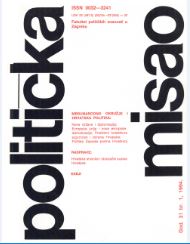Proliferacija novih država i proliferacija diplomacije
Proliferation of New Countries and Diplomacy
Author(s): Radovan VukadinovićSubject(s): Diplomatic history, Political history, Post-War period (1950 - 1989)
Published by: Fakultet političkih znanosti u Zagrebu
Keywords: WWII; postwar; new countries; diplomacy; proliferation;
Summary/Abstract: After the second world war, new countries emerged in three waves: the first immediately after the war as a result of the activities of the allied coalition; the second wave was the result of de-colonization; and the third, newest wave is the result of the fall of communist federations. The author analyses the consequences of greater numbers of countries for diplomacy. Bilateral diplomacy and organization of diplomatic services in individual countries have been faced with a series of problems: an increase in employees in ministries of foreign affairs; the need to expand the network of diplomatic missions and selection of countries in which missions are to be set up; and the difficulties of financing diplomatic services and the need for greater specialization and employment of regional experts. In international diplomacy, the work of the UN., its membership, and security council are all hampered. For this reason, regional associations and ad hoc groups formed by countries concerned with specific problems are gaining importance.
Journal: Politička Misao
- Issue Year: XXXI/1994
- Issue No: 01
- Page Range: 3-15
- Page Count: 13
- Language: Croatian

